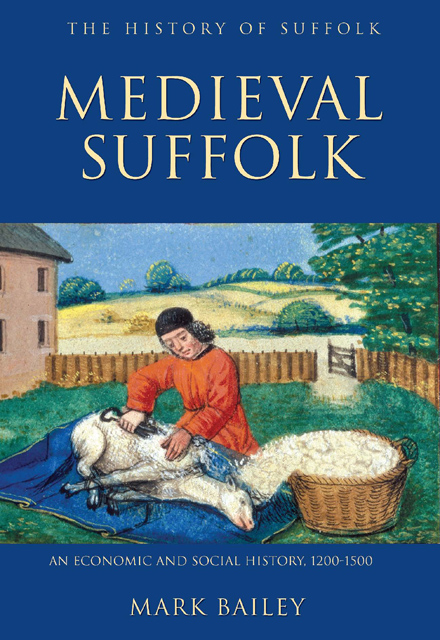Book contents
- Frontmatter
- Contents
- List of Plates
- List of Maps
- List of Tables
- Foreword
- Acknowledgements
- Note on Currency & Units of Measurement
- Abbreviations
- 1 Introduction
- 2 Landlords and their Estates, 1200–1349
- 3 Peasants and their Lifestyles, 1200–1349
- 4 The Agrarian Economy, 1200–1349
- 5 The Suffolk Landscape, 1200–1349
- 6 Towns and the Urban Environment
- 7 Commerce, Crafts and Industry
- 8 Pestilence, Rebellion and the Decline of Villeinage, 1349–1500
- 9 The Rural Economy, 1350–1500
- 10 ‘The World Turned Upside Down’: Rural Society, 1350–1500
- 11 Towns, Trade and Industry, 1350–1500
- 12 Conclusion
- Bibliography
- Index
9 - The Rural Economy, 1350–1500
Published online by Cambridge University Press: 15 March 2023
- Frontmatter
- Contents
- List of Plates
- List of Maps
- List of Tables
- Foreword
- Acknowledgements
- Note on Currency & Units of Measurement
- Abbreviations
- 1 Introduction
- 2 Landlords and their Estates, 1200–1349
- 3 Peasants and their Lifestyles, 1200–1349
- 4 The Agrarian Economy, 1200–1349
- 5 The Suffolk Landscape, 1200–1349
- 6 Towns and the Urban Environment
- 7 Commerce, Crafts and Industry
- 8 Pestilence, Rebellion and the Decline of Villeinage, 1349–1500
- 9 The Rural Economy, 1350–1500
- 10 ‘The World Turned Upside Down’: Rural Society, 1350–1500
- 11 Towns, Trade and Industry, 1350–1500
- 12 Conclusion
- Bibliography
- Index
Summary
The Black Death sent a seismic shock through the economy, whose consequences were profound and far-reaching. The loss of half the workforce in 1349 could not be absorbed without major adjustments in an economy where land and labour were the main factors of production. The agrarian economy contracted markedly, although the extent of its decline was not as great as the fall in population, because productivity – output and consumption per capita – rose. Labour had suddenly become scarcer; work was easier to find; and the survivors of the Black Death discovered that land was more readily available. These changes resulted in a rise in wages and earnings, which improved the purchasing power and economic condition of the lower orders of society, although it contributed to a decline in both land values and the profitability of many sectors of farming. Reconstructing the dramatic shifts in patterns of consumption is one of the most fascinating aspects of the post-Black Death world, and provides the key to understanding changes in the rural economy. Ordinary people now spent more on food and drink, becoming disdainful of the coarse bread, thin ale and bland pottage that had once constituted their staple diet, and they dressed in higher-quality clothes, replaced their shoes more often, and became more responsive to fashions. This stimulated demand for meat, dairy produce, wool and hides, and created more work in the textile and leather trades. For Suffolk’s commercially aware producers, capable of accessing distant markets, the massive economic jolt created by the Black Death presented both severe challenges and new opportunities.
Arable Farming
The low living standards of the mass of the populace before 1349 had placed a premium upon the production of grain, especially the cheaper crops of rye and oats. The collapse in population after the Black Death reduced this premium, and meant that a sizeable proportion of the arable land previously devoted to crops was now surplus to requirements. The range of crops available to medieval farmers was narrow, so they were unable to compensate much by diversifying the types of crops grown.
- Type
- Chapter
- Information
- Medieval SuffolkAn Economic and Social History, 1200-1500, pp. 204 - 241Publisher: Boydell & BrewerPrint publication year: 2007



